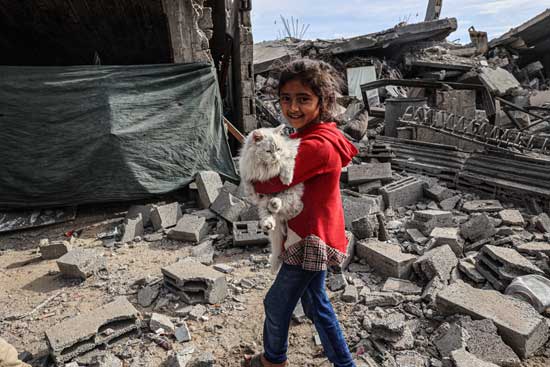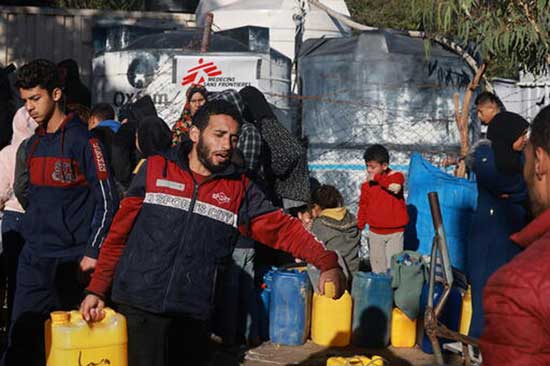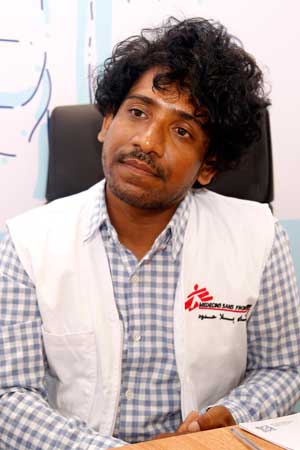He can’t forget Gaza’s children
Pradeep with the Swiss-based Medecins Sans Frontieres (MSF – Doctors Without Borders), will “never-ever forget” not so much the intense shelling and deadly missile strikes but the agony and anguish of the children of the Gaza Strip!

The children: A “lost generation” with no hope, only despair, says Pradeep. Pic by Said Khatib/AFP
The irony of the Gaza tragedy for him was that the boy’s severe burns, covering around 40% of his body, were indirect war wounds acquired when he fell into a cauldron of soup in a community kitchen, while queueing up to get his share of a scanty meal.
It was the first child death at the MSF Field Hospital in Gaza for Pradeep and the MSF team, on a six-week rotation from December 6, 2024 (last year) to January 23, this year (2025).
The conflict began on October 7, 2023, when Hamas, a Palestinian armed group and political movement in the Gaza Strip attacked Israel, killing about 1,200 people and taking more than 250 hostages. This triggered a massive Israeli military offensive. In January, this year, Israel and Hamas agreed to a fragile ceasefire and release of Israeli hostages and Palestinian prisoners.

People collecting water from the MSF distribution point, Rafah, south of Gaza. Pic courtesy MSF
Media reports state that in the past 15 months, more than 46,500 people including about 18,000 children have been killed in Gaza, with more than 100,000 people suffering injuries.
United Nations (UN) agencies meanwhile, have stated that every day, 10 children lost one or both legs with operations and amputations conducted with little or no anaesthesia while in November 2024, an analysis by the UN Human Rights Office had shown that close to 70% of ‘verified’ victims (dead) over a six-month period were children (44%, mostly in the 5-9 year-old group) and women (26%).
While in Gaza, Pradeep says that the other little boy had been brought to the MSF Hospital, having already faced a traumatic amputation due to shelling. He had no other injuries. Pradeep and his colleagues did everything they could to clean up the leg-stump but even though the boy survived, with no prosthetic or social welfare, he would be a burden to his father. His mother and aunt were dead and only his elderly grandmother was around.

Eyes tinged with deep sadness: Pradeep Samanjeeva. Pic by Priyanka Samaraweera
“Dead” and “ghostly” are how Pradeep describes his first impressions of the besieged enclave of Gaza, home to over two million Palestinians. This tiny area of around 365sq.km is hemmed in by a wide boundary with Israel, the Mediterranean Sea and a short boundary with Egypt.
"There was no sign of life. It was full of collapsed infrastructure, homes, hospitals, schools, workplaces, all razed to the ground," says Pradeep, describing how 15 aid workers including himself from MSF as well as UK-Med based in the United Kingdom, International Medical Corps. & Mercy Corps. based in the United States and the UN World Food Programme (WFP), flew into Jordan's capital Amman from different parts of the world. He did so from Sri Lanka, after bidding his mother goodbye in Galle town where he lives.
From there, donning flak jackets and helmets to protect themselves from shrapnel and explosion fragments, the final lap of the journey to the crossing from Israel to Gaza was Kerem Shalom, in armoured and bullet-proof vehicles of the UN.
Pradeep and the others were in the centre of Gaza, dubbed the world’s “deadliest” place for aid workers, to bring succour to internally displaced Palestinians who were squeezed and cramped into 40sqkm because the north and south were “gone”. These men, women and children were struggling for “basic necessities”, recalls Pradeep, giving a very long list – food, water, shelter, hygiene & sanitation, healthcare, security, education for the children and jobs for the adults. They were de-humanised and “we should be ashamed as all were silent”.
Before the war, the area had been flourishing with agriculture including expanses of olive trees and wheat and also fishing. But “we saw agony and suffering”. The displaced live in makeshift tents and try to keep warm by lighting any material at hand. December and January were bone-chilling cold and they had no winter kits. Newborns died of hypothermia, while their mothers looked on helplessly.
MSF, an international, independent medical humanitarian organisation, had been in Gaza since the beginning of the conflict and by the time of Pradeep’s rotation, there were two primary healthcare centres about 5km apart, providing outpatient wound care, psychosocial support and consultations on non-communicable diseases (NCDs) and sexual and reproductive health (SRH).
It was to the MSF Field Hospital, which supplemented whatever existing healthcare was available for trauma management and major surgical procedures including broken bones and burns that Pradeep was assigned as the ‘Project Medical Referent’ to guide the medics and handle technical logistics.
Having secured a Diploma in Nursing in Sri Lanka, Pradeep had worked at the Karapitiya Teaching Hospital as an Operating Theatre Nurse since 2008 before completing an Honours Degree in Nursing Science awarded by the Open University Malaysia (OUM) at the International Institute of Health Sciences Sri Lanka (IIHS) in 2013, winning the ‘IIHS Smart Professional’ award.
OUM describes him thus: “Pradeep’s story is one of a kind! His work has set him on a flying spree to Germany, India, Yogyakarta (in Indonesia), New Zealand, Kenya, South Sudan, Myanmar, Netherlands, Serbia and Nigeria! Hopping on UN Humanitarian Air Service flights and reporting to ‘where he is most needed’.”
What the blurb does not mention, however, is Pradeep’s own brush with near-death during the December 2004 tsunami which ravaged his home. “We lost everything and had only the clothes we were wearing,” he says, reiterating how humanitarian organisations brought hope to their vulnerable community.
Now back from Gaza in the MSF office down Ramanayake Mawatha, Colombo 2, he talks of being billeted in a guesthouse, with any movement out, whether coordinated or not, having to be cleared by the Israeli authorities. The images of Gaza are present in his mind’s eye as also the desperation echoed by the local MSF staff there that: “No one cares.”
“Dehumanized, deprived and displaced are the Palestinians of Gaza,” reiterates Pradeep, his eyes tinged with deep sadness, conceding that aid workers suffer “vicarious trauma”, a negative reaction including a range of psychosocial symptoms to trauma exposure. MSF does offer strong debriefings as well as psychosocial support to its staff.
He reverts to the children of Gaza who seem very close to his heart. The role of the child has changed there, he says with regret. These children who used to play on the streets have had to take on adulthood overnight before their time – they forage for food for their families and communities the whole day, carrying a hattiya (pot) with them; they sell whatever they can such as soap or oil; and they are in queues when the water trucks arrive or in the community kitchens.
This is a “lost generation” with no hope, only despair, says Pradeep, murmuring that now they, along with whoever is left in their families, are moving north to where their homes were before. There is nothing there, only rubble.
Do you know what these children in their threadbare clothes are holding close as they trudge back home, he asks, bringing forth an enduring and endearing image……pet cats which for them are the simple joys of childhood!
| Give people their dignity as humans, Pradeep’s plea | |
| The porous ceasefire has not eased the concerns of Pradeep Samanjeeva, who experienced it just before he left Gaza. There was a bit of relaxation on the supply side and there was no shelling but there are “lots” of needs. The always-present dangers of unexploded ordnance and shelters that have collapsed and a major security threat. “It is not safe in Gaza and the dire need is for a scale-up in humanitarian aid when these hapless people have a moment to breathe and also mourn the dead. It is vital to give people their dignity as humans,” pleads Pradeep, adding that the West Bank with over three million Palestinians should also not be forgotten. And so, Pradeep goes back to Gaza in March.
|
Searching for an ideal partner? Find your soul mate on Hitad.lk, Sri Lanka's favourite marriage proposals page. With Hitad.lk matrimonial advertisements you have access to thousands of ads from potential suitors who are looking for someone just like you.


